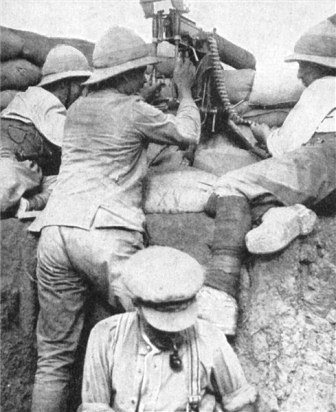26 October 1915
SUVLA - Captain John Gillam, Army Service Corps, 29th Divisional Supply Train - "A cool, fine morning, rather cloudy. Birds again flying in large covey’s overhead - wild geese and crane, etc.: men fire at them, though it is strictly against orders."
 "After tea, Morris, the Machine Gun Officer, takes me out to see his machine gun emplacements on Gun Hill, which is a little hill lying some two hundred yards behind our front line trenches, the ground on its left rising steeply to the high ridge overlooking the sea, and on its right sloping gently down to the low land ... To the left of the ravine are a few graves, and now and again a bullet kicks up the dust close by. Smith, the Hampshire Quartermaster, jokingly informs me of a certain way of getting a cushy Blighty wound. If I want one, all I have to do is to stand by these graves after dark, and wait. In under two hours, most probably in five minutes of waiting, I shall get one in the leg. The bullets come from the a Turkish trench high up on the cliff-side on our left front. To the right of the ravine one is safe, protected by a rise in the ground. On the left if the ravine one is in constant danger of a smack from a bullet, and more so at night."
"After tea, Morris, the Machine Gun Officer, takes me out to see his machine gun emplacements on Gun Hill, which is a little hill lying some two hundred yards behind our front line trenches, the ground on its left rising steeply to the high ridge overlooking the sea, and on its right sloping gently down to the low land ... To the left of the ravine are a few graves, and now and again a bullet kicks up the dust close by. Smith, the Hampshire Quartermaster, jokingly informs me of a certain way of getting a cushy Blighty wound. If I want one, all I have to do is to stand by these graves after dark, and wait. In under two hours, most probably in five minutes of waiting, I shall get one in the leg. The bullets come from the a Turkish trench high up on the cliff-side on our left front. To the right of the ravine one is safe, protected by a rise in the ground. On the left if the ravine one is in constant danger of a smack from a bullet, and more so at night."
Gillam continued on his way, untempted, to a little fortress used to house machine guns.
"At intervals are machine gun emplacements , with machine guns in position, pointing through apertures in the sand-bagged breastwork. At the first that we come to we find the sentry not looking out. I shall never forget the frightened look on his face as it meets Morris's suddenly appearing around the corner of the sand-bagged wall a few inches from him. He gets a stiff "strafing". We continue our way, and at the next emplacement come upon a sentry who presents a unique object. For his head is covered by a sand-bag, through which are holes for his eyes and mouth. To this headgear are fixed sprigs of gorse-bush, and he stands stock-still, with his head and shoulders filling the gap in the breastwork, it must be impossible for an enemy observer to detect his presence from the background of gorse and trees. Yet if he is detected a sniper has him for a dead certainty. It is so far safe for such sentries, however, for up to now no casualties have occurred amongst them from sniper's rifle."
Gillam ends his days entry with a summary of what trench warfare at Gallipoli now meant:
"Looking at the country in front of me, I can see that here on these rugged slopes the Turk would have but short shrift if he attacked us, as of course would we if we attacked. Result, deadlock, like two cats spitting and sparring at each other."
Impasse! But this road was soon to have an exit, namely evacuation.
"SOURCE:
J. Gillam, Gallipoli Diary, (Stevenage, The Strong Oak Press, 1989), pp.250-252.
